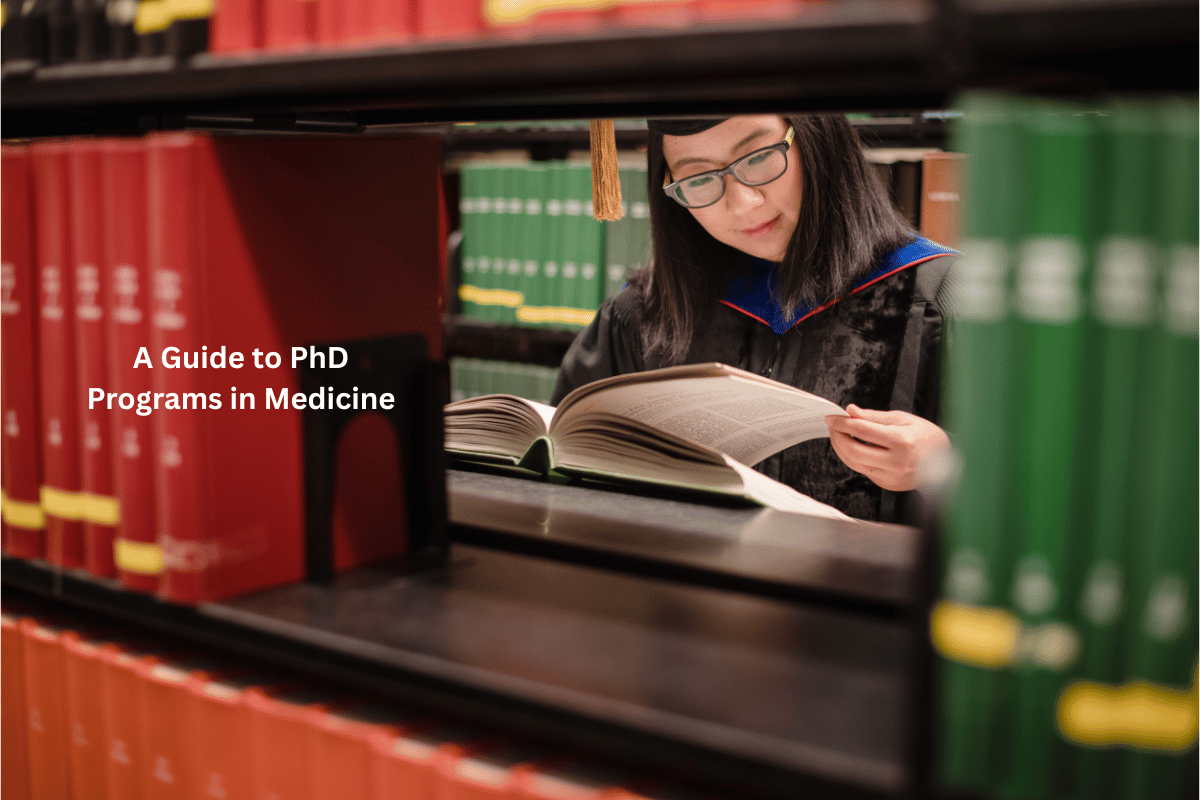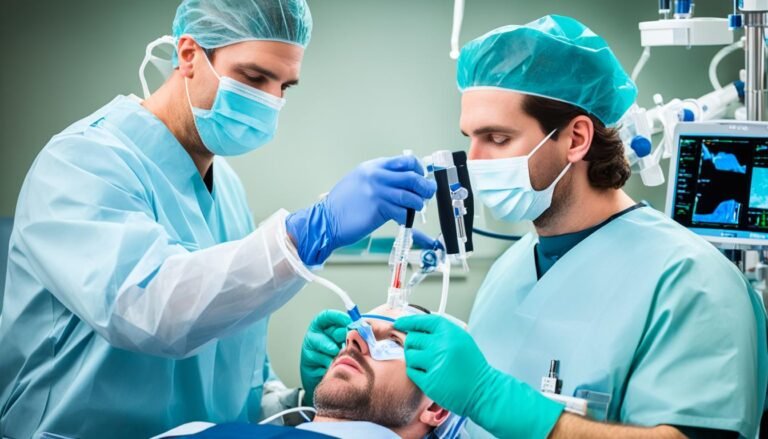A Guide to PhD Programs in Medicine
Welcome to our in-depth guide on PhD programs in medicine. If you’re thinking about a doctorate in medicine or related fields, this is for you. It’s designed to help you understand your options and excel in your academic and research pursuits.
Ready to dive into the world of scientific exploration and medical advancements? Let’s look at the different paths you can take. We’ll share advice on applying to PhD programs in medicine. Plus, we’ll give you a peek into what the programs entail. It’s time to elevate your medical career!
Key Takeaways:
- PhD programs in medicine offer a range of options, including traditional medical doctoral programs, MD-PhD programs, and dual-degree programs.
- The MD-PhD path combines medical practice with scientific research, making it an ideal choice for those interested in both fields.
- Applying to PhD programs in medicine requires a competitive application, including strong research experience and academic record.
- Choosing the right MD-PhD program is crucial for success, considering factors such as research opportunities, faculty mentors, and curriculum structure.
- Balancing medical school and research can be challenging, but effective time management and careful selection of research rotations can ensure a fulfilling experience.
Is the MD-PhD Path Right for You?
The MD-PhD path is for people who love both medicine and research. It’s perfect for those wanting to get a medical degree and a PhD. This section will help you know if it’s a good fit for you.
Benefits of Pursuing a Doctorate in Medicine and Research
The best thing about the MD-PhD path is it combines clinical work and research. You learn both about medicine and how to do scientific studies. This double knowledge is powerful for making new medical discoveries.
Choosing this path gives you many job options. As a physician-scientist, you can do groundbreaking research. You also get to help improve how we care for patients. This mix of clinical and research skills help you do meaningful work in the medical field.
Challenges to Consider
There are also tough parts about the MD-PhD path to think about. It’s demanding because you have to study medicine and do research. Good time management and hard work are key.
It also takes longer than just getting a medical degree. You need extra years for the research part. But, being able to help with new discoveries is a big reward for many students.
Career Opportunities for Physician-Scientists
This path leads to many exciting careers. You can work at hospitals, research places, drug companies, or for the government. You might lead research, help make new policies, or teach.
The skills you get from the MD-PhD path let you do many different jobs. You can work directly with patients or focus on research.
Explore the MD-PhD Path
If you’re into both medicine and research, the MD-PhD path is a great choice. It’s a way to really help the medical field and improve how we care for people.
Keep reading to find out more about getting a doctorate in medicine and research.
What are Your Options?
Thinking about a PhD in medicine? There are lots of options. We’ll look at different programs to see what fits your goals.
1. Medical Doctoral Programs
These programs dive deep into research and academic medicine. You’ll take classes, do lab work, and have hands-on clinical experiences. This mix helps you become a well-rounded doctor-scientist.
After finishing, you might work in a university, a lab, or a clinic. All these places value research heavily.
2. MD-PhD Programs
MD-PhD mixes medical training with deep research. It’s a special chance to get two degrees at once. You’ll earn an MD and a PhD, getting ready to link science with practice.
If you love medicine and research, this program might be for you.
3. Dual-Degree Programs
Dual degrees give you a PhD in medicine and another degree at the same time. You might get an MBA or an MPH. These programs are perfect if you want to work in areas like healthcare management or public health.
Having these two degrees makes you stand out. It opens up new job paths outside the lab or clinic.
Importance of Research Focus
Choosing a PhD program means picking one with the right research focus. This ensures you dive deep into what you love. You should look into the faculty’s research, what funding is available, and how the school helps with research.
Next up, we’ll talk about applying to these programs. Section 4 has tips to help you make your application great.
Applying to PhD Programs in Medicine
Getting into PhD programs in medicine needs a strong application. You should highlight your research skills, grades, and why you want to study medicine. Here’s how to build a solid application:
1. Highlight Your Research Experience
Talk about your research in detail. This includes papers you’ve written, talks you’ve given, or any projects you’ve been part of. Mention the labs you’ve worked in and the skills you’ve learned.
2. Demonstrate an Impressive Academic Record
Your grades are crucial. Keep them high in your undergrad and any further studies. Add any honors or awards. Talk about courses that match your research interest.
3. Craft a Compelling Personal Statement
Your personal statement shows why you love medicine and research. Talk about why you’re motivated, your experiences, and your future. Make each program feel special by showing how your interests match theirs. Get advice to make your statement stand out.
4. Selecting the Right Program
Do a lot of research on different programs. Look at the faculty, what research you can do, how you’ll be funded, the program setup, and where it’s located. Find programs that match what you want to study to increase your chances.
5. Navigating the Application Process
Get all your application documents ready early. Do everything according to each program’s rules. Make sure you apply before the deadline without any missing parts.
“Applying to PhD programs in medicine is a competitive process, but with careful planning and preparation, you can present a strong application that highlights your potential as a researcher and scholar.”
– Dr. Sarah Smith, Director of Admissions, School of Medicine
6. Stay Organized and Keep Track
Keep a detailed record of everything for each program. Make a checklist to make sure you don’t miss anything. Stay in touch with the admissions office for any new info.
7. Prepare for Interviews
Some PhD programs will want to interview you. Know about the program, the faculty, and current research. Practice answering questions about your own research. Dress nicely and show you’re excited about the opportunity.
8. Seek Feedback and Revise
Before sending your application, get feedback from others. They can help make your application better. Listen to their advice and fix anything they suggest. Check your application for any mistakes a few times.
Follow these tips to make a competitive application. Keep your enthusiasm up and show why you love research and medicine.
Choosing the Right MD-PhD Program
When you’re thinking about MD-PhD programs, picking the right one is crucial. It should match what you want to study and where you see your career going. The program you choose will shape your future in academics and research.
Research Opportunities
Research within an MD-PhD program is key. You should look for programs that explore a wide variety of research. This will let you get involved, bring new ideas to light, and set the path for your medical career.
Faculty Mentors and Expertise
Faculty mentors are a big part of any MD-PhD program. It’s smart to check out the professors. See if they are experts in your area of interest. Good mentors will not just help with your studies but also offer advice and support during your time in the program.
Curriculum Structure
Know how the program is set up before you choose. A good program should help you do well in medicine and research. Look for a mix of medical training and research chances in the curriculum. This balanced approach gets you ready for a great career as a doctor who also does research.
To choose the best MD-PhD program for you, consider what they offer in research, mentoring, and how they teach. Find a program that fits your interests and goals well. This way, you’ll start a fulfilling journey in medicine and research.
Balancing Medical School and Research
It’s vital to handle both medical school and research well in the MD-PhD program. Using your time wisely and thinking about each task carefully is crucial. You can keep a good balance by remembering some key points and using certain strategies.
Research Rotations
At the start, you get to see many research areas through rotations. This lets you experience different labs and projects. It helps you decide which lab is best for your big thesis work.
On these rotations, try different research fields to see what you like and what fits your goals. It’s also a chance to practice time management. Make sure you focus on what’s important during each rotation.
Laboratory Selection
Choosing the right lab for your main thesis is very important for success. Look at what the lab studies, the chances for growth, and if it matches your interests.
Meeting with potential mentors is key. Talk about their work and see if they’re a good fit for you. A mentor who helps and works with you can really boost your learning and success. Also, think about what the lab offers, like money, tools, and chances for further research.
Time Management
Managing your time well helps to balance school and research. Have a plan that gives time for both areas. Include time for study, classes, research, and lab meetings.
Know when you work best and plan hard tasks for those times. Methods like the Pomodoro or Eisenhower’s Matrix can help you stay on track. They help you focus on what’s most important.
Keeping a balanced life is key during the MD-PhD. Make sure to also have time for yourself, your hobbies, and friends. This is crucial for staying fresh and avoiding burnout.
By being smart about research rotations, choosing a good lab, and managing your time, you can do well in both areas. With effort and a solid plan, you can meet the goals of the MD-PhD program. This opens doors for a great career as both a doctor and a scientist.
Tips for Balancing Medical School and Research
| Tip | Description |
|---|---|
| 1. Prioritize Tasks | Figure out what’s most important in both medical school and research, then focus on those first. |
| 2. Create a Schedule | Make a schedule that gives time to study, do research, and attend classes separately. |
| 3. Maximize Productivity | Know when you work best and do the hard tasks then. |
| 4. Seek Support | Don’t be afraid to ask for help from mentors, advisors, and other students. |
| 5. Practice Self-Care | Always make time for yourself, your hobbies, and spending time with friends. This keeps you healthy and happy. |
Tips for a Successful PhD Experience
Starting a PhD in medicine can be thrilling and rewarding. Here’s how to make your PhD journey and future path as a physician-scientist successful:
1. Maximize Productivity
Managing time wisely is key to boosting your productivity. A well-balanced schedule is essential. Also, break big tasks into smaller steps and know what’s due first. Use tools like setting goals or apps to manage time effectively.
2. Seek External Funding
Looking for outside funding can help support your research. You can find help through scholarships, grants, and more. Make sure your research ideas are strong and match the funding you’re seeking. Many groups offer funds just for medicine PhD students.
3. Publish Abstracts and Articles
Sharing your research through abstracts and articles is important. It shows your work and builds your reputation in the scientific world. Work with others to write about what you’ve researched. Then, submit them to events and journals in your field to get noticed and make connections.
“Publishing your research is like planting seeds that grow into new ideas and collaborations.”
– Dr. Sarah Thompson, Associate Professor of Biomedical Sciences
4. Build Networks and Seek Mentorship
Connecting with others and finding good mentors is vital for your PhD success. Go to events and join groups online to meet people in your field. Look for mentors who can help in school and future career. Also, make friends and connections who can offer advice and work on projects with you.
5. Develop Essential Skills
It’s important to sharpen skills needed for your future as a scientist and doctor. These include being a good communicator, thinker, and problem solver. Take part in events and projects that let you practice these skills. This will make you ready for the challenges ahead.
Follow these tips to really enjoy and succeed in your medical PhD. Be productive, find funding, show your research, connect with others, and build your skills. With focus, effort, and smart work, you can prepare for a great career in science and medicine.
Transitioning Back to Medical School
After finishing the PhD part of your MD-PhD program, you’re moving back to medical school. This shift might seem overwhelming at first. However, getting ready can make the journey smoother. Here are key tips for adjusting back to medical school:
1. Brush up on Medical Knowledge
If you’ve spent a lot of time on research, it’s time to refresh your medical knowledge. Look over your notes, read your textbooks, and check online for more info. Working with study groups can also help you learn from others and share what you know.
2. Prepare for the USMLE
Start getting ready for the United States Medical Licensing Examination (USMLE) soon. You should set aside time just for studying, use practice tests, and maybe take some review courses. This will prepare you better for the USMLE.
3. Choose Rotations Strategically
When picking rotations, think about what areas you like and what you’ve researched. Choosing the right ones can give you a jump-start in your future career. It also lets you meet professionals who work in your area of interest.
4. Fit in with a New Class
It’s important to connect with your new peers when you go back to medical school. Take part in orientation and join different clubs. This helps you make friends and be more involved in the school community.
It’s essential to keep a balance between your studies and personal life now. Remember to take care of yourself, manage your time well, and reach out to others for help. This could be your professors, mentors, or fellow students.
Top Resources for USMLE Preparation
Preparing for the USMLE is a vital part of any medical student’s path to success. For those seeking personalized guidance and support, working with experienced USMLE tutors can significantly improve study outcomes and boost confidence. Choosing the right tutoring service can make a meaningful difference in exam performance and overall progress toward a medical career.
Conclusion
This guide has given a full look at PhD programs in medicine, focusing on MD-PhD paths. We’ve covered picking this route, the application, choosing the best program, and how to handle both medical school and research well. By using this advice, future students can see the MD-PhD path clearly and its benefits for a physician-scientist career.
Choosing an MD-PhD is a big step that mixes medical practice with research. It requires strong will, hard work, and love for both areas. This path equips you with unique skills for a rewarding career as a physician-scientist. You can push medicine forward and make a real difference in patient care.
Starting your journey as a physician-scientist means being devoted to your dreams, finding good mentors, and always being curious. The MD-PhD road is tough, but it brings huge rewards. Use all the help you can get, like doing research, meeting with professors, and attending networking events. This will make your time more productive and enjoyable.
FAQ
Q: Is the MD-PhD Path Right for You?
A: The MD-PhD path is perfect if you love both medicine and research. This path lets you mix caring for patients with doing new research. But, think hard about its upsides and downsides before choosing.
Q: What are Your Options for PhD Programs in Medicine?
A: For a PhD in medicine, you have a few choices. Look into medical doctoral programs, MD-PhD programs, and dual-degree programs. It’s key to pick a program that matches what you want to research and your career aims. Opt for programs heavy on research to get the best training and tools for success.
Q: How Can I Successfully Apply to PhD Programs in Medicine?
A: For a strong PhD application, focus on building your research skills and keeping your grades top-notch. Also, a standout personal statement can help. Choose your desired program wisely and handle the application process with care. Be keen on each application’s details and make your application show off your strengths and unique background.
Q: How Do I Choose the Right MD-PhD Program?
A: Picking the best MD-PhD program is essential for a rewarding career in medicine and research. Look at their research projects, the mentorship they offer, and how their curriculum runs. Choose a program that fits your research interests and supports your success in both medicine and research.
Q: How Can I Balance Medical School and Research in an MD-PhD Program?
A: It’s tough but doable to manage both medical school and research. Try out different research areas during rotations to find what you like. Get good at time management to handle everything. Also, taking care of yourself is key to keeping a good balance.
Q: What Tips Can You Offer for a Successful PhD Experience in Medicine?
A: To thrive in your PhD in medicine, aim for high productivity, look for funding, and be active in research. Getting your studies and research published will boost your career. Don’t forget to network and find mentors for advice and support.
Q: How Do I Transition Back to Medical School after Completing the PhD Portion?
A: Moving back to medical school after your PhD part might take some getting used to. Refresh your medical knowledge and prepare for exams. Strategically plan your rotations. Join your new class and ensure you maintain a good work-life balance in this next phase.







